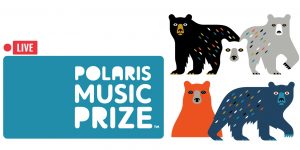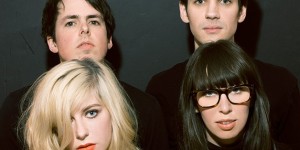Late to The Party with Andy Shauf
by Luke Ottenhof
September 15, 2016
Andy Shauf on the art of the album and life after leaving the prairies.
Andy Shauf is from Saskatchewan, but if you’re reading this, you probably knew that already. The perennial ‘lonesome prairie folk singer’ schematic has been a central focus of almost any conversation about Shauf and his gorgeous, weathered, macabre alt-folk since his debut with 2009’s Darker Days. It’s an indictment of our desire for familiarity, comfort, and sameness that we have to paint these artists into corners in order to understand them and their music.
“People talk about my music as being very ‘prairie,’” he remarks over the phone. “[For 2015’s] The Bearer of Bad News, a lot of the interviews were centred around what Saskatchewan was like, cause it seemed so…”
He goes quiet, and I imagine he’s pulling on a cigarette as an excuse to take a break from speaking. He waits before continuing, collecting his thought: “That’s just the music I make, because I grew up in that place. I would definitely be making different music if I was born somewhere else.”
Shauf is enjoying a well-deserved spot of calm and relaxation between touring his gorgeous new record, The Party, which was released in May on Arts and Crafts in Canada, and marked his label debut for Epitaph imprint ANTI- Records in the US. The record is a mournful descent into the inner workings of a social gathering; drinking, dancing, confessing, betraying, falling down, all from a different set of eyes, and ostensibly, a different voice.
The record has reaped gains across a wide swath of fronts: pop-folk juggernauts The Lumineers took Shauf on tour across Europe earlier this year, and the album is shortlisted for Canada’s esteemed Polaris Music Prize, a benchmark recognition of superiority, originality, and creative integrity across an entire record. The inclusion of The Party on the list, which taps nine other Canadian artists in contention, speaks to Shauf’s masterful grip on creating not just a unique, exciting collection of songs, but a cohesive and purposeful work, a track list with meaning; the album as art.
“I feel like the art of the album is less important these days. The albums that I really love are the ones that just stand by themselves. The whole thing is great, and you don’t find yourself skipping tracks a lot,” Shauf articulates. “That’s something to aspire to, that I aspire to, is making albums that people want to listen to the whole thing. It’s easy to just write 12 songs and then put them all together and say that it’s an album, but I think that there’s something more to be said when you’re really careful about how you’re going to execute that collection of songs.”
The Party reflects and fulfills those aspirations. While one could certainly spin the lazy, late-summer evening anthem, “The Worst In You,” for hours on end, The Party is an album that begs unity; it’s a rare moment in music when the single song feels incomplete without being played in sequence, to the sequence’s completion. It would be ludicrous to suggest one fixate only on one corner of a painting; we’d extract a fraction of the artist’s intention. Somehow, The Party mirrors this philosophy in audio format. It’s an impossibly difficult task, but one Shauf already seems to have mastered.
It’s a record of few victories and many defeats, a eulogy for an underwhelming night that promised more and fell short in a heap of insecurities and addictions, not least of all alcohol. On “Quite Like You” he mutters, “I’m not one to speak up but I’ve had a few.”
“I was writing a lot from the perspective of the dependent. That’s like autobiographical in a way. It’s hard for me to socialize without having a drink,” Shauf explains.
“I think that one of the main themes is regret, or feeling ashamed a lot,” he continues, slowly. “There’s a fine balance between using alcohol as something to kind of open you up a little bit, but usually if you have to do that, you don’t know where to draw the line, so you end up kind of in a regret or shame experience. It’s a familiar scenario unfortunately.”
Shauf makes a point to assert the value of these disastrous nights: “You learn a lot from regrets so it’s important to have them.”
Shauf treads a tasteful and engaging line between fiction and reality throughout the record’s 10 tracks, relating these narratives with a gentle hand and gentler voice, keeping himself a length away from the scene at hand. But art isn’t created in a vacuum, and The Party wasn’t written in one either. It inevitably reads as a ramshackle, subtle but gutting autobiography, years of Shauf’s life honed and relayed in what at first listen is a tasteful, melancholy symphony of pop-folk, and what at second, third, and fourth listens is revealed to be a pained chain of admissions and regrets.
“You end up writing about things, and even if you’re trying to write something that’s fictional, you end up shedding a lot of yourself,” he says. “There’s definitely a lot of projection that happens with it, subconscious or intentional.
“It’s a valuable thing for me, because it kind of helps me get thoughts out there. I’m not the most talkative, ‘talky-feelings’ person, so it’s a helpful tool.”
In a way reminiscent of fellow Canadian wordsmith and the world’s proudest Winnipegger (not that there were any challengers for the title) John K. Samson, Shauf writes in a way that doesn’t necessarily penetrate at first glance; the words demand a double — or triple — take before they start to sink their delicate knuckles into your gut, slowly, but steadily.
“I’m not being weird/I just mean that you’re a good friend/It’s hard to explain/Just forget I said anything,” he fumbles sadly on “To You,” an all-too-familiar botched drunken confession.
He continues the foot-shooting elsewhere on the record: “I’m spilling my drink as I really start/Tearing one of my best friend’s apart/She’s getting uneasy and my drunken speech/Ends as my hand finds its way to hers,” giving achingly real form to the waking nightmare in which you backstab your friend in attempt to sleep with his girlfriend, all under a thick, desperate six-beer haze. These are at times nauseatingly familiar narratives that become almost painful to engage with. Shauf breathes life into them via intricate, bountiful instrumental compositions.
“The lyrics are always the hard part for me, for sure,” he relates. “I can work all day on music no problem, but trying to come up with lyrics is super hard. It’s a lot of going back and tweaking lyrics so that things sit together how I want them to. It’s kind of like a compromise.
“A lot of the time when I’m trying to come up with an idea for a song and playing through it in my head, I’m super direct. It just feels like musical theatre or something, so that’s a struggle too: trying to be subtle and trying to have a story move along without the effort of really concretely setting a time, a place and events.”
And somehow, not having a defined time, place or event lends what sounds and feels like an intimate, hyper-specific and explicitly located collection of songs a universal, familiar quality. It’s another thing Shauf shares in common with his prairie comrade; these songwriters take the immediate, the personal, the minute, and extrapolate them into a broader, shared experience; a catharsis on a provincial level, a story that stretches from Halifax to Victoria and back. It’s in our hometown and it’s everywhere we go and will ever be; we can’t escape these truths. He’ll hopefully still be distilling these truths honestly for years to come, but now he’ll be far from grain elevators and grocery stores where everyone knows your name. Shauf calls Toronto home these days.
“I’m excited to see what kind of effect this has on my life,” he says of the move. “I’m just writing, so I mostly stay in my apartment, try to venture out every once in a while.
“Total culture shock coming from Regina,” he laughs.
I can hear his lighter click in the background. He ponders if his writing will change with the move.
“Might still come out totally prairie, but…” He trails off into quiet.
Tags: Music, Featured, Interviews, Andy Shauf





